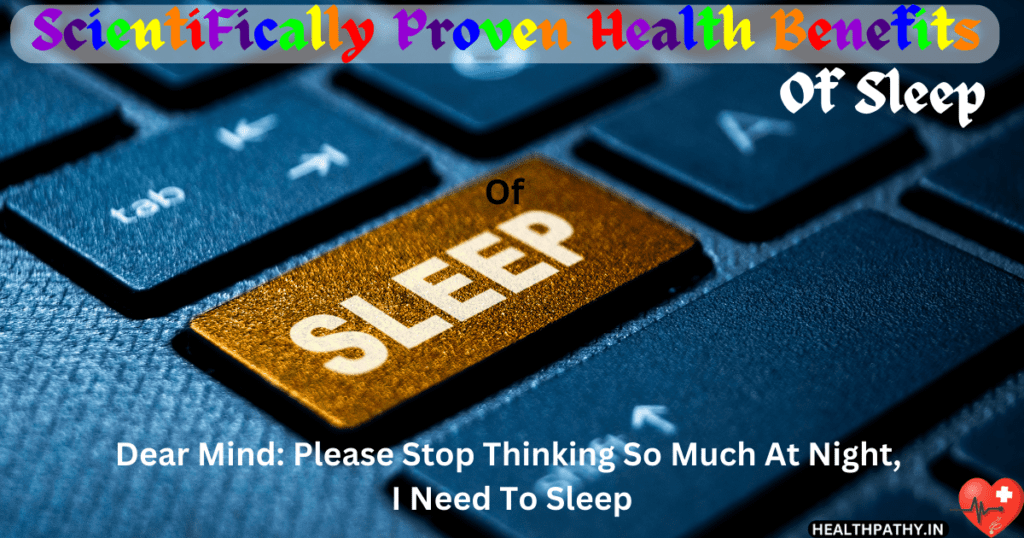Hello, I’m a homeopathic doctor with almost two decades of clinical experience, having begun my career in 1997. My passion is to clarify complicated medical concepts so that they are understandable to everyone. Join me on this instructive journey as I break down the Scientifically Proven Health Benefits Of Sleep in a way that is relatable and accessible to everybody. Let’s explore the world of holistic health together!


The Silent Healer: Exploring the Profound Benefits of Quality Sleep
Sleep is frequently undervalued in our fast-paced world, but it’s one of the most fundamental factors in maintaining appropriate fitness. We’ve all experienced those groggy, less-than-most beneficial days after a bad night’s sleep; however, the significance of sleep is going some distance past the occasional tired morning. In this text, we’ll explore the massive and regularly underestimated blessings of good sleep, from bodily and mental well-being to its position in ailment prevention.
The Body’s Repair Shop:
- Cellular Recovery: At the end of the day, all your physical exercise and activities cause wear and tear on your body cells and organs, so while you sleep, your body enters a heightened state of repair. Cellular processes that rejuvenate and restore tissue take place in the course of deep sleep cycles, contributing to better skin, healthier hair, and stepped-forward muscle recuperation.
- Immune Support: A well-rested body is better equipped to combat infections. Sleep enhances the immune system’s performance by producing cytokines, proteins that assist in altering the immune response.
- Inflammation Reduction: Chronic inflammation is connected to a wide variety of fitness troubles, together with coronary heart disease and cancer. Quality sleep enables lower irritation markers and contributes to normal health.
The Mind’s Reset Button:
- Mood Stabilization: A lack of sleep can leave us irritable, tense, and confused. Quality sleep performs a critical function in regulating mood and emotional well-being.
- Cognitive Function: Sleep is crucial for reminiscence consolidation and trouble-fixing. It complements creativity and selection-making skills, leading to better typical cognitive features.
- Stress Management: Deep sleep enables the management of pressure with the aid of regulating the body’s cortisol levels. A well-rested mind is more capable of managing existence’s demanding situations and more capable of handling life’s challenges.
Physical Health Benefits:
- Heart Health: A steady loss of sleep is related to an accelerated risk of heart disease, high blood pressure, and stroke. Quality sleep allows for maintaining a healthy coronary heart.
- Weight Management: Sleep influences the hormones that control the urge for food. Chronic sleep deprivation can result in weight gain, while great sleep helps weight control efforts.
- Diabetes Prevention: Insufficient sleep impacts insulin sensitivity, raising the risk of type 2 diabetes. A desirable night’s sleep helps regulate blood sugar levels.
- Pain Management: Sleep is vital for pain recovery. It facilitates lessening sensitivity to aches, making it a precious thing in persistent pain control.
Preventing Disease:
- Reducing Cancer Risk: The body’s circadian rhythm, encouraged by sleep, can also play a role in stopping cancer. Disrupted sleep styles may additionally boost cancer risk.
- Alzheimer’s Prevention: Quality sleep helps the brain’s natural detoxing process, decreasing the chance of neurodegenerative diseases like Alzheimer’s.
The Art of Longevity:
- Aging Gracefully: Quality sleep contributes to younger pores and skin, sharp intellectual faculties, and average energy, extending not simply lifespan but “healthspan.”
- Longevity and Cellular Repair: Cellular repair and regeneration at some point in sleep can also have a role in prolonging life. The quality of sleep often matters more than the quantity.
Optimizing Sleep:
- Sleep Hygiene: Tips and techniques to enhance sleep best and duration, from setting up an ordinary sleep timetable to growing at ease with sleep surroundings.
- Common Sleep Disorders: An overview of sleep issues like insomnia, sleep apnea, and restless legs syndrome, along with treatment options.
- Nutrition and Sleep: The connection between diet plan and sleep, with an emphasis on sleep-promoting and sleep-disrupting meals.
How To Sleep Better
Getting a very good night’s rest is crucial for typical health and well-being. Here are a few hints to help you relax and sleep better:
1. Stick to a Sleep Schedule: Try to go to bed and wake up at the same time each day, even on weekends. This facilitates altering your frame’s inner clock.
2. Create a Bedtime Routine: Establish a calming pre-sleep routine to signal to your body that it is time to wind down. This could include studying a book, taking a warm bath, or training relaxation physical games.
3. Make Your Sleep Environment Comfortable: Ensure your bedroom is conducive to sleep. This way, there is a cozy mattress and pillows in addition to a cool, dark, and quiet room. Use blackout curtains and earplugs if essential.
4. Be Mindful of Your Diet: Avoid heavy food, caffeine, and alcohol near bedtime. These can disrupt your sleep.
5. Get Regular Exercise: Regular bodily activity can promote better sleep. However, attempt to complete your exercise at least some hours earlier than bedtime to permit your body to wind down.
6. Limit Screen Time: The blue light emitted by smartphones, tablets, and computer systems can interfere with your sleep. Try to avoid monitors for at least an hour before bedtime.
7. Manage Stress: High-stress levels can make it difficult to sleep. Practice stress-reduction strategies, including meditation, deep breathing, or yoga to relax your thoughts.
8. Watch Your Napping: While brief power naps may be fresh, long or abnormal daylight hours of napping can disrupt your sleep style. If you want to nap, keep it brief (20–30 minutes).
9. Stay Comfortable: Make sure your bedroom temperature is at ease and your bedding is suitable for the season.
10. Limit Liquid Intake: Avoid ingesting too many beverages close to bedtime to reduce nighttime awakenings to the restroom.
11. Manage Your Thoughts: If racing thoughts hold you conscious, do not forget to keep a notepad by your bed to write down any issues or ideas to address tomorrow.
12. Seek Natural Remedies: Some people find herbal teas like chamomile or valerian root beneficial for resting earlier than bedtime.
13. Limit Clock Watching: If you awaken in the middle of the night, strive now not to check the time as it may create anxiety and prevent you from getting sufficient sleep.
14. Consult a Healthcare Professional: If sleep issues persist, seek advice from a healthcare issuer or sleep professional. There can be an underlying medical condition, consisting of sleep apnea, that requires treatment.
Remember that improving your sleep habits may take time. Be patient and steady with your efforts to create a sleep-friendly environment and establish an ordinary sleep pattern. Over time, those changes can cause more restful and rejuvenating sleep.


The best sleep conditions
The best sleep conditions can range from person to person, but there are a few well-known tips for growing pleasant sleep surroundings:
1. Comfortable Mattresses and Pillows: Invest in a mattress and pillows that fit your private comfort preferences. Your bed must provide appropriate aid and be free from lumps or sagging.
2. Cool and Dark Room: Keep your bedroom cool, ideally between 60 and 67 degrees Fahrenheit (15 and 20 degrees Celsius). Use blackout curtains to dam out external mildew, which can intrude along with your sleep cycle.
3. Quiet Environment: Minimize noise disruptions with the aid of earplugs, a white noise machine, or calming historical past sounds, together with ocean waves or nature sounds.
4. High-Quality Bedding: Choose soft, breathable, and natural-fiber bedding like cotton or linen sheets. Ensure your blankets and comforters suit the season—heavy for wintry weather and lighter for summer.
5. Adequate Ventilation: Ensure precise airflow to your bedroom. Fresh air can enhance sleep nicely.
6. Screen-Free Zone: Avoid the use of digital devices like smartphones, tablets, or laptops earlier than bedtime because the blue light emitted from monitors can intrude on your sleep.
7. No Clock-Watching: Remove visible clocks from your room, as continuously checking the time can create tension and disrupt your sleep.
8. Relaxing Colors: Consider calming and soothing colors for your bedroom decor, which include soft blues, veggies, or impartial tones.
9. Bedtime Routine: Develop a pre-sleep routine that facilitates your relaxation. This would possibly consist of reading, taking a heat bath, or practicing rest techniques like deep respiration or meditation.
10. Limit Food and Drink: Avoid huge, heavy meals, caffeine, and alcohol close to bedtime. These can intrude on your sleep.
11. Manage Stress: Use pressure-reduction strategies to clear your mind earlier than sleep. This can encompass journaling, mild stretches, or taking note of calming songs.
12. Comfortable Sleepwear: Wear cozy and breathable sleepwear, and make sure your room temperature matches the season.
13. Proper Sleep Position: Find a sleep position that is comfortable for you. For the majority, dozing on their back or aspect is high-quality for maintaining proper spinal alignment.
Remember that the correct sleep conditions explained in Scientifically Proven Health Benefits Of Sleep may be surprisingly personal, so it is critical to locate what works best for you. Experiment with exceptional factors to create a snooze-friendly environment that promotes restful and rejuvenating sleep.


Sleep patterns:
Sleep patterns refer to the normal, routine sequences of sleep stages and cycles that individuals revel in at some point during a standard night’s sleep. There are three primary sleep patterns:
1. Monophasic Sleep: In this pattern, a person sleeps once per day, generally for a prolonged duration throughout the night, and stays awake during the day. This is the most common sleep pattern in many Western cultures.
2. Polyphasic Sleep: In this sample, individuals have multiple sleep episodes for the duration of the day and night time. There are exclusive kinds of polyphasic sleep, including:
- Biphasic Sleep: This involves two distinct sleep intervals within a 24-hour cycle, such as a longer core sleep at night and a shorter nap during the day.
- Everyman Sleep: This sample includes a shorter middle sleep at night, commonly around 3–4 hours, along with several 20–30 minute naps for the duration of the day.
- Uberman Sleep: The Uberman sleep pattern includes more than one brief nap (around 20-half hours) lightly allotted at some point of the day, totaling about 2-3 hours of sleep in a 24-hour period.
Each of these sleep patterns has its benefits and disadvantages. Monophasic sleep is considered the norm in many societies, and it allows for a consolidated duration of rest at some point in the nighttime, which may be restorative. However, a few people find polyphasic sleep patterns more ideal for their lifestyle or circadian rhythms. Polyphasic sleep requires more planning to make sure that general sleep wishes are met, as shorter sleep episodes can impact sleep quality and cognitive functioning.
Conclusion:
It’s crucial to observe that the overall period and high quality of sleep a person needs can vary, and the choice of sleep pattern must be based on a person’s preferences, day-to-day schedules, and the ability to maintain basic health and well-being. It’s also crucial to prioritize getting enough total sleep to fulfill your body’s sleep desires, regardless of the pattern you pick.
Quality sleep is not luxurious; it is a fundamental pillar of fitness. By knowing and appreciating the multifaceted benefits of sleep in Scientifically Proven Health Benefits Of Sleep, we can prioritize this natural healer in our lives. Better sleep isn’t only the key to feeling refreshed each day but also to living a fitter, happier, and doubtlessly longer lifestyle. Let’s include the energy of high-quality sleep and make it a cornerstone of our proper well-being.
Must Read:
Scientifically Proven Health Benefits Of Family
Scientifically Proven Health Benefits Of Social Networks
Must Watch:
Harmony Of Homeopathy_The Art & Science
Friday 04 April 2025 5:33:41:PM
- Acromegaly Cures With Scientifically Proven Homeopathy - 8 February 2024
- Acidity Cures With Scientifically Proven Homeopathy - 1 February 2024
- Appendicitis Cures With Scientifically Proven Homeopathy - 27 January 2024




